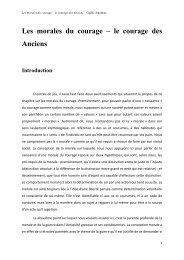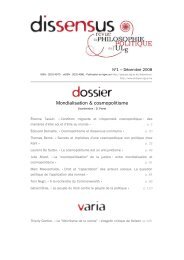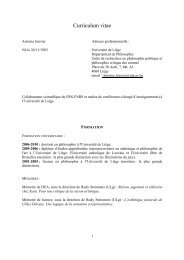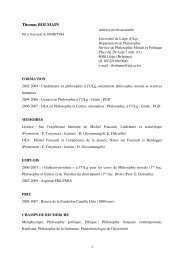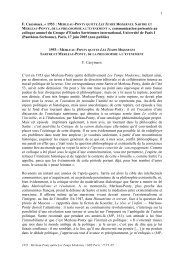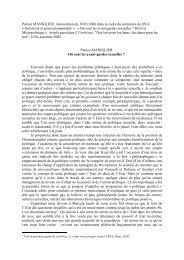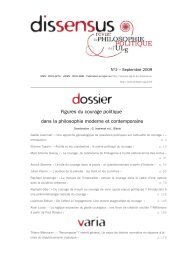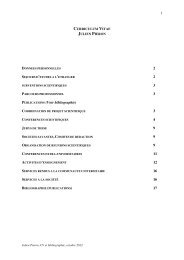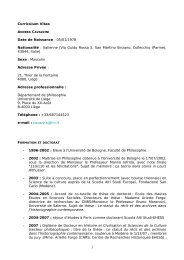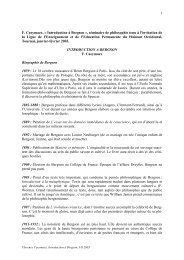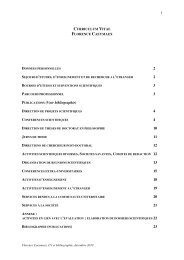Subjectivations politiques et économie des savoirs - Service de ...
Subjectivations politiques et économie des savoirs - Service de ...
Subjectivations politiques et économie des savoirs - Service de ...
You also want an ePaper? Increase the reach of your titles
YUMPU automatically turns print PDFs into web optimized ePapers that Google loves.
– Sophie Bourgault: « Prolegomena to a rehabilitation of Platonic mo<strong>de</strong>ration » – p. 131<br />
H. Arendt are unconvinced, Strauss is <strong>de</strong>finitely interested in tapping into the potential<br />
of sophrosyne. For Strauss, a mo<strong>de</strong>rate soul and a mo<strong>de</strong>rate (which means, to him,<br />
conservative) politics may well be the best we can g<strong>et</strong>.<br />
Now, the association b<strong>et</strong>ween sophrosyne and conservatism is not entirely unfair. Until<br />
Plato, sophrosyne had been viewed by the Greeks as an aristocratic virtue which called<br />
for the recognition of one’s proper station in life, and <strong>de</strong>ference to one’s superiors and<br />
to a city’s laws. 35 Socrates thus builds on traditional Greek usage when he says, in the<br />
Republic, that mo<strong>de</strong>ration entails, « for the majority of people », obedience to rulers<br />
(389e). That being said, while significant, this obedience of the ruled to their rulers is<br />
not, in my view, the most significant element of sophrosyne when consi<strong>de</strong>red from the<br />
perspective of Plato’s corpus as a whole. If it is clear that in the Republic Plato gives<br />
much weight to this subordination, his other dialogues put the emphasis elsewhere (in<br />
particular, on self-control). What should be stressed here is that Plato was concerned<br />
with restraining the unnecessary <strong><strong>de</strong>s</strong>ires of all citizens; in fact, he was even more<br />
concerned with the self-control and the self-knowledge of individuals likely to hold<br />
positions of power. It is these people, after all, who have the greatest capacity to<br />
cause harm to the city and to other human beings. 36 That obedience to rulers is not the<br />
most <strong>de</strong>cisive element of Platonic sophrosyne is ma<strong>de</strong> manifest in the Laws—where<br />
the ties b<strong>et</strong>ween sophrosyne and the obedience of the lower ranks are almost absent.<br />
All in all, it is too simplistic to suggest that mo<strong>de</strong>ration is a virtue for sheep or, as<br />
Philippa Foot has suggested, for the timid 37 .<br />
Just as the concord b<strong>et</strong>ween reason and <strong><strong>de</strong>s</strong>ires was not to be envisioned as a tyranny<br />
of the former over the latter, mo<strong>de</strong>ration in the city is not the forceful domination of the<br />
many by the few, as suggested by Neal Wood. Wood un<strong>de</strong>restimates how meaningful it<br />
is to Plato to <strong><strong>de</strong>s</strong>cribe mo<strong>de</strong>ration as a kind of harmony. Like justice, « mo<strong>de</strong>ration<br />
spreads throughout the whole. It makes the weakest, the strongest, and those in<br />
b<strong>et</strong>ween – wh<strong>et</strong>her in regard to reason, physical strength, numbers, wealth, or anything<br />
else – all sing the same song tog<strong>et</strong>her » (Republic 431e). As we will see below, the<br />
reference to song is much more than an attractive m<strong>et</strong>aphor: mousikē is the key to<br />
civic harmony and to a proper internalization of sophrosyne.<br />
35<br />
36<br />
37<br />
But it was also more than that: in Homer, sophrosyne also had to do with soundness of mind; in<br />
Aeschylus it entailed <strong>de</strong>ference towards one’s mortal status (and as such, was seen as the opposite of<br />
hubris). See H. North, Sophrosyne: Self-Knowledge and Self-Restraint in Greek Literature, Ithaca,<br />
Cornell University Press, 1966.<br />
This is un<strong>de</strong>rscored by the choice of Critias and Charmi<strong><strong>de</strong>s</strong> – notorious tyrants and relatives of Plato –<br />
as Socrates’s interlocutors in the Charmi<strong><strong>de</strong>s</strong>.<br />
P. Foot, Virtues and Vices, Oxford, Oxford University Press, 2002, p. 18.



